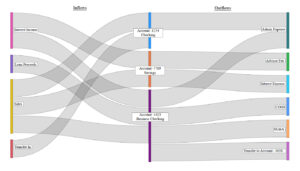Optimizing Technology for Improved Analysis
By Jon Klerowski, CPA, CFE, ABV; Brian McDonough, CPA, CFE; and Robert Gaines, CISSP, CECI, CCFI and C|OSINT
Preventing fraud is among the top priorities of any organization. If and when fraud occurs, it is critical to stop the scheme as quickly as possible and triage the situation. As this is International Fraud Awareness Week, it is fitting to gain a better understanding of the cutting-edge resources now available to forensic accountants to assist in the battle against fraud. Additionally, we are sharing our previous article Latest Fraud Trends as a reference to equip your organization with strategies to prevent, deter and detect fraud more effectively.
Keeping Up with the Technological Advances
Forensic accountants blend accounting, auditing and investigative skills to assist with fraud examinations and legal disputes. Complementary to these skills are tools and as the old adage says “a tradesperson is only as good as their tools.” When Microsoft released Excel (in 1985!), forensic accountants ditched the green bar and adopted the new technology. Similarly, today’s forensic accountants have powerful new resources that go beyond the basic spreadsheet to effectively and efficiently investigate and arrest financial fraud.
Staying at the forefront of technological advances is required to keep our organizations safe and deliver the best possible service to clients.
Data Analytics: Large Data Volume is No Problem
Data analytics help collect, transform and organize data into a framework that makes it easier to understand. Clear data formats give users the clarity they need to make more informed decisions.
Considering that forensic accountants are typically called to analyze large volumes of complex financial data, having the right tools at your disposal to speed through the tedious data-entry and extraction process is key — particularly when these tasks represent a significant component of an investigation.
Advanced data analytic software, frequently combined with AI capabilities, allows us to avoid manual extraction of months, or even years, of financial data before the specialized analysis can begin. An additional benefit: increased accuracy in a fraction of the time manual extraction would have taken a staff member.
Bottom Line: Leveraging data analytics optimizes cost for the client and allows the engagement team to spend more effort focusing on forensic analysis.
Data Visualization: A Picture Paints a Thousand Words
To be effective, forensic accountants must distill, synthesize and communicate their processes and results to various stakeholders, including attorneys, judges, juries and business owners. An often underestimated challenge is how to take a complex analysis and simplify it to be understood by all levels of constituents. Fortunately, there are now many new resources available that can assist with this. For example, software tools can extract data contained in other sources, such as an Excel spreadsheet, then choreograph it to expose the data’s story.
Bottom Line: Relationships within the data can be quickly and more meaningfully understood once visualized.

Digital Forensics: We Gotcha!
Digital Forensics tools help investigators examine the activities of target users by viewing their document open/close timeframes and web or application histories. These tools often recover deleted or hidden documents as well.
To obtain file details, logs and hidden data necessary to support an investigation, Digital Forensics can also examine the contents of cell phones, tablets, laptops, workstations, servers and even the contents of virtual and hosted data environments (O365, Google Suite, Drop Box, etc.). Investigators can even trace cryptocurrency transactions across the blockchain, if fraud is suspected in this area. All the gathered data is correlated and examined using specialized tools to provide the investigation team with all the information necessary to conduct their procedures.
Bottom Line: Digital Forensics helps investigators by providing technical details to establish a timeline that demonstrates the who, what, where, when and how across the technical environment. The newest versions of these forensic tools now leverage AI to identify hidden data patterns that even skilled examiners could miss, ensuring that no data point is left unexamined.
We Can Help
Thanks to advances in technologies, forensic accountants can more efficiently and effectively assist in the investigation of alleged accounting or financial malfeasances. This both saves costs and allows for a more thorough and complete analysis of the data.
The specialists at PKF O’Connor Davies continue to stay at the forefront of advancements in data analytics, visualization and digital forensics tools and can help your organization modernize its fraud-prevention efforts.
Contact Us
If you would like to discuss how our PKF O’Connor Davies specialists can advise you on financial or digital forensic matters or legal disputes, please contact your client service team or:
Jon Klerowski, CPA, CFE, ABV
Partner
jklerowski@pkfod.com | 781.937.5729
Brian McDonough, CPA, CFE
Director
bmcdonough@pkfod.com | 781.937.5362
Robert Gaines, CISSP, CECI, CCFI and C|OSINT
Director, Cybersecurity and Privacy Advisory
rgaines@pkfod.com | 212.867.8000

